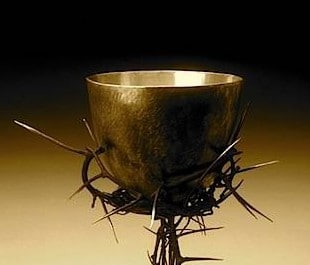Can you drink the cup of greatness?

In the passage from Mark 10:35-45, we see an incredibly bold request from James and John, two of Jesus’ closest disciples. They ask, “Teacher, we want you to do for us whatever we ask of you.” It’s a striking moment, and it might seem arrogant at first glance. But if we’re being honest, don’t we all, at some level, feel the same? Deep down, we want Jesus to do for us whatever we ask. We often believe we know what’s best for ourselves, even when we say, “Not my will, but Yours be done.” There’s that quiet, hopeful whisper inside that really means, “But I hope it’s my way, not Yours.”
The Desire for Glory and the Misunderstanding of Greatness
When James and John ask Jesus to let them sit at His right and left hand in glory, they reveal a misunderstanding of what that “glory” truly means. Like many of us, they wanted to secure places of honor without fully grasping the implications. They saw Jesus as an earthly king who would overthrow the Romans and establish a powerful kingdom. They wanted in on the action before anyone else could claim those prized positions.
But Jesus, in His wisdom, responds, “You do not know what you are asking.” How often have we charged into situations thinking we knew everything, only to realize later how limited our understanding was? James and John didn’t grasp the full picture. They didn’t understand that Jesus’ path wasn’t one of earthly triumph, but of suffering, sacrifice, and ultimately, crucifixion.
The Call to Drink the Same Cup
When Jesus asks them, “Are you able to drink the cup that I drink, or be baptized with the baptism that I am baptized with?” they confidently reply, “We are able.” They didn’t know what they were committing to. Jesus clarifies that they will indeed drink from His cup and share in His baptism, but He also explains that the positions of honor they desire are not His to grant. Those places are prepared by God.

Here, Jesus shifts the focus away from the earthly, ego-driven desire for greatness. Following Him requires a willingness to endure suffering and self-denial. “The cup” refers to the life of sacrificial love and service, and “the baptism” points to the ultimate end—suffering and death. To follow Jesus isn’t about gaining power or status, but about embracing a life marked by humility, service, and, ultimately, surrender.
True Greatness in God’s Kingdom
As the other disciples grow angry with James and John, Jesus seizes the moment to redefine what greatness looks like. He says:
“Whoever wishes to become great among you must be your servant, and whoever wishes to be first among you must be slave of all.”
This is a radical redefinition of greatness. We often think that serving others is a stepping stone to recognition and status, that humility is a way to gain respect. But Jesus isn’t giving a formula for achieving greatness; He’s dismantling the very idea of greatness as the world defines it. The path to greatness in God’s kingdom requires a complete transformation of our values.
Our ego seeks recognition, control, and power, but true greatness in God’s eyes is found in becoming a servant. Our self—the ego—has no place in God’s kingdom. It’s the ego that wants to be first, that seeks validation and status. But Jesus tells us that to be great, we must become the “slave of all,” meaning we must let go of our desire for power and recognition and instead serve others selflessly.
The Cup and the Baptism: A Lifestyle of Sacrifice
When Jesus speaks of drinking His cup and sharing His baptism, He is referring to two different aspects of His mission. The cup refers to the ongoing lifestyle of self-sacrificial love that He lived. Jesus constantly served others, even when it meant putting His own needs and comfort aside. The baptism points to the culmination of that lifestyle—the cross. The ultimate act of love is laying down one’s life for others, even for those who hate and persecute you.
This is what Jesus is calling His disciples to. A lifestyle of service, of taking on the pain and injustice of the world and responding with love, even when it costs everything. It’s no wonder He told James and John they didn’t know what they were asking for—they were eager to follow Jesus to glory without understanding that the road to glory leads through the cross.

Are We Willing to Drink the Cup?
So, what about us? Are we willing to drink the cup that Jesus drinks? Are we ready to live a life of service, enduring criticism, injustice, and even suffering, while returning love to those who hurt us? This isn’t a romanticized call to servanthood—it’s a hard, gritty path of dying to our ego and living for others. It’s about enduring hardship with a faithful heart, trusting that God is working in ways we cannot see, even when life is unfair.
Jesus challenges us to embrace a life of humble service, a life that the world may never recognize as great. But in God’s kingdom, this is the true path to greatness.
Transformation Through Service
Perhaps Jesus is telling us that if our desire is for greatness as the world defines it, then we need to be transformed. And that transformation begins with serving others. To be shaped by the humility and love that Jesus lived out, we must become the lowest, the last, the servant of all. This is the opposite of how the world operates, where power and dominance rule. But in God’s kingdom, greatness is found in surrender, in becoming a servant.
Jesus, the King Who Serves
Jesus, the rightful King of all creation, allowed Himself to be despised, beaten, and crucified. He demonstrated a kind of kingship that turns earthly power structures on their head. He didn’t come to rule with a heavy hand, but to serve and to give His life as a ransom for many. James and John were thinking of a different kind of king, one who would conquer by force. But Jesus shows us that His way—the way of the cross—is the only true path to victory.
Final Thoughts: The Challenge of Discipleship
As followers of Jesus, we are called to drink from His cup and follow Him in a lifestyle of sacrificial love and service. It’s not an easy path, and it’s certainly not one that promises worldly recognition or success. But it is the path to true greatness in God’s kingdom. The challenge of discipleship is to let go of our ego, to serve others with no expectation of reward, and to trust that God is working through us in ways we cannot yet understand.
Are we willing to follow Jesus on this path, even when it leads us to places we didn’t expect? Are we ready to serve, even when it means letting go of our own desires for greatness?
